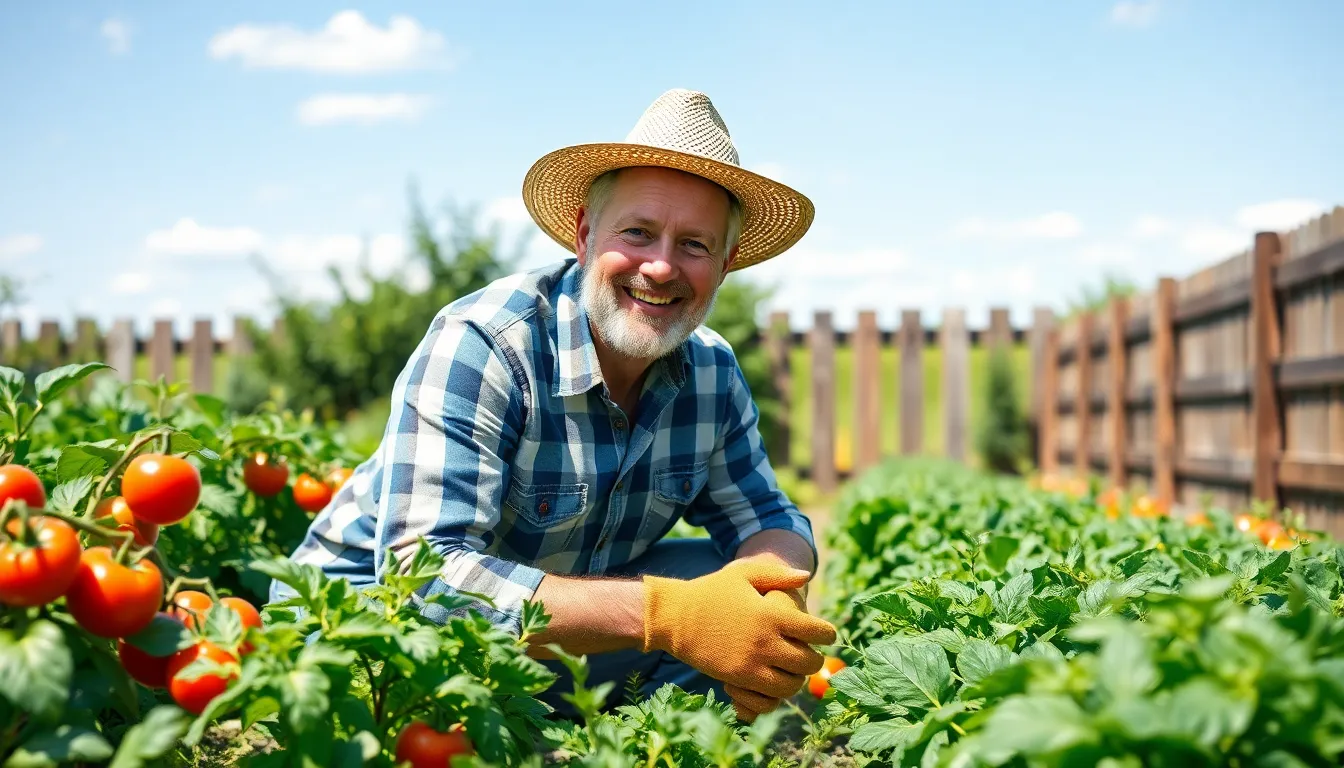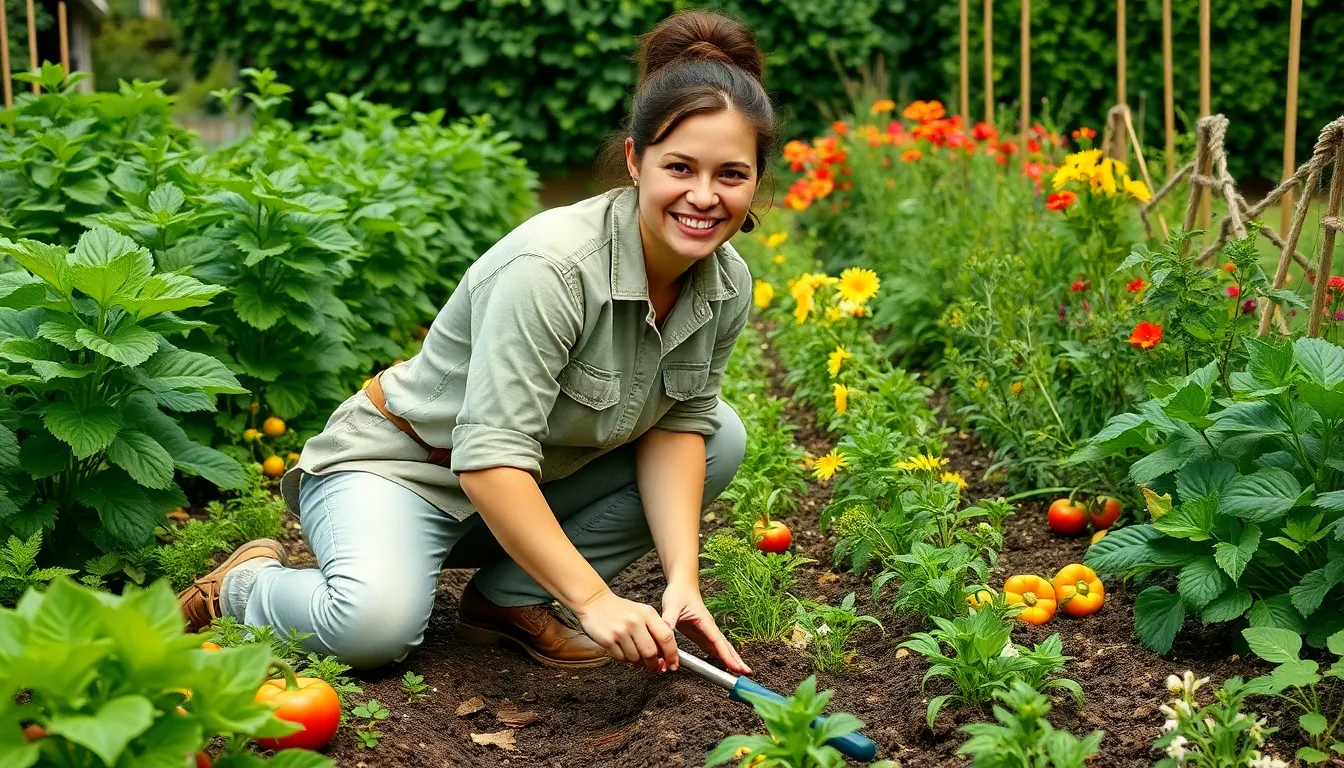Physical Address
304 North Cardinal St.
Dorchester Center, MA 02124
Physical Address
304 North Cardinal St.
Dorchester Center, MA 02124

Imagine stepping into your backyard and plucking a ripe, juicy tomato straight off the vine. Organic vegetable gardening isn’t just about growing food; it’s about cultivating a lifestyle that’s as fresh as your veggies. With a little dirt under your nails and a sprinkle of patience, anyone can transform their patch of earth into a thriving oasis of health and flavor.
Organic vegetable gardening focuses on growing vegetables without synthetic fertilizers, pesticides, and herbicides. This method enhances soil health and promotes biodiversity. Practitioners often use natural amendments like compost or manure to nourish plants.
Many gardeners rotate crops to prevent nutrient depletion and reduce pest populations. Cover crops like clover or rye improve soil structure and add organic matter. Effective weed management involves practices like mulching or hand-pulling rather than chemical herbicides.
Water conservation is also crucial in organic gardening. Techniques such as drip irrigation minimize water waste and ensure plants receive the necessary moisture. Companion planting offers additional benefits, as certain combinations of plants can deter pests and enhance growth.
Organic gardening supports healthier ecosystems by avoiding harmful chemicals. This approach aligns with sustainable practices that promote environmental stewardship. Many local communities have seen increased biodiversity due to the rise in organic gardening.
Gardening organically can lead to significant cost savings on groceries. Cultivating one’s own vegetables provides access to fresh, nutrient-rich produce. Various resources, including books and local garden clubs, offer guidance and support for aspiring organic gardeners.
Prioritizing healthy food, environmental responsibility, and personal fulfillment makes organic vegetable gardening appealing and rewarding.

Organic vegetable gardening offers numerous advantages that contribute to a healthier lifestyle and a sustainable environment. This practice nurtures not only the body but also the earth.
Fresh produce from organic gardens contains higher levels of vitamins and minerals compared to conventionally grown vegetables. Nutrient-rich foods boost energy and promote overall well-being. Organic vegetables lack harmful pesticide residues, reducing health risks associated with chemical exposure. Eating organic also supports better digestion, as naturally grown produce often contains beneficial microorganisms. Furthermore, gardening can be a stress-relieving activity, enhancing mental health and providing physical exercise. With these benefits, organic vegetable gardening contributes to maintaining a balanced, healthy lifestyle.
Organic vegetable gardening fosters biodiversity and enhances soil health, promoting a more resilient ecosystem. This method avoids synthetic chemicals, helping protect local wildlife and water sources. By practicing crop rotation and composting, gardeners improve soil fertility and structure. Organic practices also support pollinators, crucial for food production. Water conservation techniques, like drip irrigation, utilize resources efficiently and reduce waste. Supporting local ecosystems through organic gardening encourages sustainable practices that benefit the environment and future generations.
Essential tools enhance the organic gardening experience, making it efficient and enjoyable. Using the right equipment simplifies tasks and promotes better results.
Securing basic gardening tools lays the foundation for successful organic gardening. A sturdy shovel digs into soil and turns it over for planting. Hand trowels assist with planting seeds and removing weeds. Pruning shears maintain plant health by trimming excess growth. Rakes help level and aerate soil, while a garden fork loosens compacted earth. Gloves protect hands from thorns and dirt, ensuring comfortable gardening.
Specialized organic gardening tools optimize methods while reducing environmental impact. Soil testers measure pH levels and nutrient content, helping gardeners tailor soil amendments. Compost bins provide an efficient way to recycle kitchen scraps into nutrient-rich soil amendments. Drip irrigation systems conserve water while delivering moisture directly to plants. Plant supports, such as stakes and trellises, assist climbing varieties like tomatoes and beans. Handheld weeders allow for precise removal of weeds without disturbing nearby plants.
Soil preparation plays a vital role in organic vegetable gardening. This process ensures the garden contains the nutrients essential for plant growth and development.
Different soil types affect vegetable gardening outcomes. Clay soil retains moisture but drains poorly, while sandy soil drains well but lacks nutrients. Loamy soil combines elements from both, offering ideal conditions for most vegetables. Testing the soil type aids in choosing suitable plants, which promotes healthy growth. Amending soil based on its type improves overall fertility, ensuring plants access necessary nutrients.
Organic amendments enhance soil structure and fertility. Compost adds nutrients and beneficial microorganisms, promoting healthy soils. Manure enriches the soil with nitrogen and other essential elements. Individual gardeners often incorporate green manure, which involves growing cover crops and then plowing them back into the soil. Bone meal, blood meal, and rock phosphate serve as additional sources of nutrients. Regular application of these amendments supports soil health, allowing for sustainable vegetable production.
Effective pest and disease management is crucial in organic vegetable gardening. This approach relies on natural methods to maintain a healthy garden ecosystem.
Companion planting deters pests and enhances plant growth. Marigolds, for instance, repel nematodes and attract beneficial insects. Using beneficial insects, like ladybugs and lacewings, reduces aphid and pest populations significantly. Neem oil, derived from the seeds of the neem tree, serves as an effective natural pesticide against a variety of garden pests. Homemade sprays, such as garlic or hot pepper solutions, also provide an organic alternative to chemical treatments.
Crop rotation prevents the buildup of pathogens specific to certain plant families. Regularly removing infected plant debris minimizes disease spread. Keeping plants spaced properly improves air circulation, reducing humidity levels that favor disease development. The utilization of disease-resistant plant varieties offers additional protection against common ailments. Applying organic mulch suppresses weeds and creates an unfavorable environment for pathogens.
Harvesting organic vegetables requires timing and technique to ensure maximum flavor and nutritional value. Vegetables should typically be harvested in the morning when temperatures are cooler, leading to better taste and freshness. Checking for ripeness is essential; each vegetable has its own indicators, such as color, size, and firmness. Engaging in gentle twisting or cutting helps avoid damage to plants during harvesting.
Using sharp, clean tools is crucial to prevent injury to the plants and promote healthy regrowth. Monitoring the weather can also influence the decision to harvest; dry conditions ensure vegetables remain crisp. Aim for gradual harvests, especially for leafy greens, to encourage continuous production. She should avoid overcrowding harvested produce, allowing air circulation to maintain freshness.
Storing organic vegetables correctly extends their shelf life. Most vegetables benefit from refrigeration, which slows down spoilage. For leafy greens, wrapping in a damp paper towel and placing them in a perforated plastic bag helps maintain moisture levels. Root vegetables fare best in a cool, dark area, such as a cellar or garage; this environment prevents sprouting. Furthermore, using airtight containers can thwart moisture loss and keep vegetables fresh longer.
Embracing organic vegetable gardening offers numerous benefits that extend beyond the garden. It cultivates a deeper connection to food while promoting healthier lifestyles and sustainable practices. By utilizing natural methods and tools, gardeners can create vibrant ecosystems that thrive without harmful chemicals.
The rewards of this gardening approach include fresher produce and significant savings on grocery bills. As individuals engage in this fulfilling activity, they not only enhance their physical and mental well-being but also contribute positively to the environment. With patience and dedication, anyone can transform their gardening experience into a rewarding journey that nourishes both body and soul.